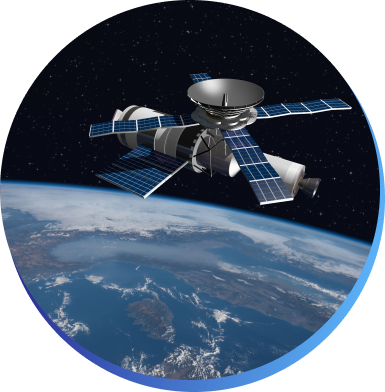
Reports
1. India DefSpace Symposium 2025 Technical Report
The Technical Report of the Indian DefSpace Symposium 2025 (jointly developed by ISpA and Amity University) synthesises proceedings and sectoral takeaways from India’s landmark defence-space policy forum, providing in-depth insight and actionable policy guidance.
2. Enabling the New Space Economy: ISAM as a Pillar of Orbital Sustainability
Co-authored by the Indian Space Association (ISpA) and IIFCL Projects Ltd, this landmark report establishes In-Space Servicing, Assembly and Manufacturing (ISAM) as a critical foundation for a sustainable and future-ready space economy. The publication presents a comprehensive blueprint for leveraging ISAM to extend satellite lifetimes, reduce orbital debris, and unlock new in-orbit business models. It analyses global best practices, emerging technologies, PPP structures, and innovative financing mechanisms essential to building a resilient and commercially viable space ecosystem. Drawing on international case studies, including NASA’s Hubble servicing missions and Northrop Grumman’s MEV life-extension program, the report highlights how ISAM is reshaping operational capabilities worldwide. With clear policy pathways and strategic recommendations, the report positions India to emerge as a global leader in orbital sustainability, operational resilience, and collaborative space innovation. We also acknowledge OrbitAID Aerospace and the UK Space Agency as Supporting Partners for this publication, whose contributions highlighted the status of Industry and agencies in advancing sustainability solutions.
3. SPACE Year End Report 2024
SPACE Year End Report 2024
4. Decadal Vision Jan 23
The 'Decadal Vision and Strategy for the Development of the Indian Space Economy' aims to propel India's space industry to represent 8% of the global market, reaching USD 44 billion by 2033 through strategic pillars of action and enabling capabilities.
5. ISpA Year-end Report
A year of Opportunities and Achievements
6. ISpA-nasscom-Deloitte: Exploring Opportunities for Indian Downstream Spacetech Report
The fundamental purpose of India’s space programme has been solving the real problems of man and society. Over the past six decades, this purpose has created an ecosystem that continues to generate solutions that address the country’s critical socio-economic and strategic challenges
7. ISpA-EY Report "Developing the Space Ecosystem in India: focussing on Inclusive Growth"
The report focuses on developing a holistic space ecosystem in India. It covers the outlook of the space economy in India and its potential to accelerate the socio-economic development of the country. It includes the global space economy and its growth drivers. The report focuses on the entire lifecycle of the space economy, including manufacturing, ground and launch segment, startups and end-user services. This report also provides regulatory landscape and inputs from industry to propel growth in the Indian space industry.
Note- The report is a compilation of industry inputs and secondary research. Members of ISpA have provided key inputs on the satellite space in India.8. Economic Survey of India 2021-2022
"Government has opened up space sector to private players, which will enhance the socio-economic use of space assets and activities. During the first half of 2021-22, the Services sector received over US$ 16.7 billion FDI accounting for almost 54 per cent of the total FDI inflows into India. Startups in India have grown remarkably over the last six years. The number of new recognised startups have increased to over 14,000 in 2021-22 from only 733 in 2016-17. As a result, India has become the third largest startup ecosystem in the world after the US and China. Further, a record 44 Indian startups have achieved unicorn status in 2021 taking the overall tally of unicorns in India to 83, most of these are in the services sector."
9. Space Situational Assessment 2021
"Growing usage of large constellations, growth of private investment, the on-orbit breakup and collisions and anti-satellite testing leaving thousands of fragments in the orbits are contributing to spurt in space debris. Operational satellite Consequently, objects of more than 10cm sized in LEO are are expected to reach 60,000 by 2030,” as per ISRO.

Policies
1. Gujrat Space Policy 2025
2. FDI Policy 2024
3. Norms, Guidelines and Procedures for Implementation of Indian Space Policy-2023 in respect of Authorization of Space Activities (NGP)
4. Telecommunication Act 2023
5. Indian Space Policy 2023
6. National Geospatial Policy 2022
7. Draft Digital Personal Data Protection Bill 2022
8. Draft Indian Telecommunication Bill 2022
"This Act consolidates and amends the laws governing provision, development, expansion and operation of telecommunication services, telecommunication networks and telecommunication infrastructure and assignment of spectrum and for matters connected or incidental thereto"
9. New Public Sector Enterprise (“PSE”) Policy
PSE policy was notified on 4th February 2021. The policy intends to minimise the presence of the Government in the PSEs across all sectors of the economy. Under the New PSE Policy, public sector commercial enterprises have been classified as Strategic and Non- Strategic sectors. Following four broad strategic sectors have been delineated based on the criteria of national security, energy security, critical infrastructure, provision of financial services and availability of important minerals- (i) Atomic Energy, Space and Defense; (ii) Transport and Telecommunication; (iii) Power, Petroleum, Coal and other minerals; and (iv) Banking, Insurance and Financial Services
10. Draft National Geospatial Policy 2021
Notified on 27th April, 2021, the government promulgated a comprehensive Draft National Geospatial Policy to nurture and develop the geospatial ecosystem of the country to encourage spatial thinking, generate geospatial knowledge, strengthen geospatial infrastructure, promote use of Geospatial Data, Products, Solutions and Services [GDPSS] and boost geospatial entrepreneurship for socio-economic development of the nation.
11. Draft Space-based Remote Sensing Policy of India 2020
The Draft Space Remote Sensing Policy 2020, announced by the Government of India on October 15, 2020, proposes to promote better data access to space-based remote sensing data, with the exception of "sensitive data and information," and participation from a wider variety of stakeholders.
12. Draft Spacecom Policy 2020
In line with the decision of the Union Cabinet and the Prime Minister allowing private companies to participate in India’s space sector, the Indian Space Research Organisation (ISRO) in October, 2020, notified the Draft Spacecom Policy 2020 to govern the commercial use of orbital slots, satellites, and ground stations for communication needs. The policy details how private players can get authorisation for setting up new communication satellites and ground stations.
13. National Digital Communications Policy 2018
The Government intends to offer 50 Mbps universal broadband access to every individual as part of the National Digital Communications policy of 2018. It has set a goal of giving every Gram Panchayats 1 Gbps access by 2020 and 10 Gbps by 2022.
14. Policy framework for Satellite Communication in India 1997
"The fundamental aim of the Policy Framework for Satellite Communications is to develop a healthy and thriving communications satellite and ground equipment industry as well as satellite communications service industry in India."
15. The Indian Wireless Telegraphy Act 1933
"An Act to regulate the possession of wireless telegraphy apparatus. Whereas it is expedient to regulate the possession of wireless telegraphy apparatus in India"
16. Indian Telegraph Act 1885
"In India, the usage of wired and wireless telegraphy, telephones, teletypes, radio communications, and digital data communications are all governed under the Indian Telegraph Act, 1885. It grants the Government of India sole authority and privileges for the establishment, upkeep, management, licencing, and control of all wired and wireless communications on Indian territory."

Schemes
1. Startup India
Startup India scheme was launched on 16th January 2016 with an aim to promote and support start-ups in India. It envisions building a robust startup ecosystem in the country for nurturing innovation and providing opportunities to budding entrepreneurs.
Concept/Research Papers
1. Valuation and Fundraising in Aerospace Startups: TRL vs. MRL - India’s Road to Space Industrialization
The book provides aerospace startups, investors, and policymakers with a rigorous analytical and narrative guide to understanding Technology Readiness Levels (TRLs) and Manufacturing Readiness Levels (MRLs). It introduces a unified framework to benchmark innovation, de-risk investment, and streamline industry development. By explaining how TRL/MRL frameworks intersect with funding cycles, supply-chain alignment, and industrial scalability, the book highlights readiness—both technological and manufacturing, as the cornerstone of India’s future industrial leadership. It underscores how readiness metrics will shape startup growth, investment evaluation, and integration with national and global space supply chains, ultimately enabling India’s accelerated path toward space industrialisation and the orbital economy.
2. ISpA–Satsure Joint Paper on Agristack Solutions
The ISpA–Satsure Joint Paper, ‘India’s Sovereign AgriStack: Powering the Future of Agriculture from Farmers to the Cloud’, details digital public infrastructure strategies enabling sovereignty, inclusiveness and farmer-led innovation in the agricultural sector—demonstrating how geospatial intelligence and sectoral collaboration can rewrite the future of Indian agriculture.
3. ISpA releases Concept Paper on Space Technology Parks
Join Us
Join us to actualize Prime Minister’s dream of a five-trillion dollar economy & make India a leading global space economy by 2030.
BECOME A MEMBER




